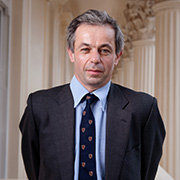David Klenerman

David Klenerman
2020 Millennium Technology Prize
Professor Sir David Klenerman’s research, as well as his approach to it, were well ahead of his time. His work on next-generation DNA sequencing began as “blue-sky” research in 1997, when he sat in a pub in Cambridge, United Kingdom to discuss ideas with his colleague, Professor Sir Shankar Balasubramanian. Both men were excited about the possibility of making genome sequencing quicker and more scalable. In 1998, they co-founded the biotech company Solexa (now a part of Illumina) and co-invented Solexa sequencing.
Solexa sequencing is now widely used in basic biological and biomedical research. It allows for human genomes to be sequenced over one million times faster than in 2000, and at a much lower cost. The method is also routinely used as part of medical treatment, including non-invasive prenatal testing, the detection and treatment of cancer, and the diagnosis and treatment of rare genetic diseases, particularly for children. Sir David envisions an era of preventive medicine in the near future—entire populations can be sequenced for a complete record of their DNA that informs them of the type of diseases they might be predisposed to getting as well as the lifestyle adjustments they can make to lead healthier, more fulfilling lives.
Sir David is a biophysical chemist who had worked with BP Research following his postdoctoral research. He saw that it was common practice for companies to assemble cross-functional teams to work on projects, a contrast to academic research which typically happened in silos back then. He appreciated how the strength in diverse knowledge could take his research forward in unimaginable ways. His industry experience played an important role in shaping his collaborative approach to research when he rejoined academia as a faculty member seven years later in 1994.
On his close collaborative relationship with Sir Shankar, Sir David shares that they not only complement each other in terms of expertise, but they get along well as friends. He believes that their close friendship was key to the success of building a company together. Sir David has stated that when times are rough, it is important that both parties know each other well enough to navigate through difficult conversations that need to be had.
Sir David is currently the Royal Society Professor of Molecular Medicine at the Department of Chemistry, University of Cambridge. He is known for his development and application of new physical methods, particularly fluorescence spectroscopy, to biological and biomedical problems.
A Fellow of the Royal Society and the Academy of Medical Sciences, Sir David has received recognition for his scientific contributions, including the 2018 Royal Medal by the Royal Society, the 2020 Millennium Technology Prize (shared with Sir Shankar) and the 2022 Breakthrough Prize for Life Sciences (shared with Sir Shankar and Professor Pascal Mayer). In 2019, he was knighted in the UK for his development of high-speed DNA sequencing.

